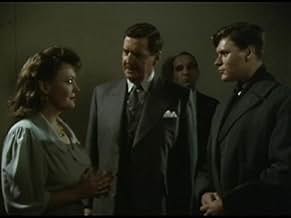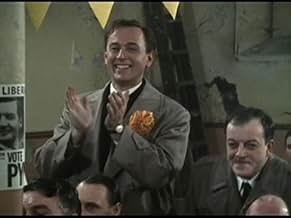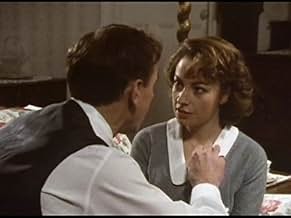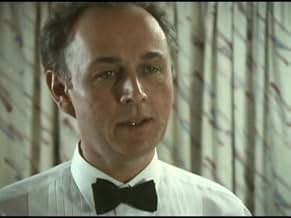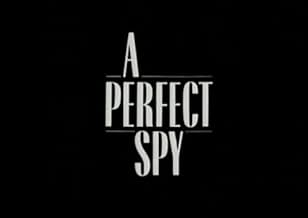IMDb-BEWERTUNG
7,3/10
1127
IHRE BEWERTUNG
Füge eine Handlung in deiner Sprache hinzuThe rise and fall of Magnus Pym and his career through intelligence. From chance meetings with people will be important to him in the future to a life in Czechoslovakia, Pym weaves his way t... Alles lesenThe rise and fall of Magnus Pym and his career through intelligence. From chance meetings with people will be important to him in the future to a life in Czechoslovakia, Pym weaves his way through the complicated world of espionage.The rise and fall of Magnus Pym and his career through intelligence. From chance meetings with people will be important to him in the future to a life in Czechoslovakia, Pym weaves his way through the complicated world of espionage.
- Für 2 Primetime Emmys nominiert
- 1 Gewinn & 6 Nominierungen insgesamt
Folgen durchsuchen
Empfohlene Bewertungen
This is without doubt my favourite Le Carre novel and it is transformed to the silver screen with all the love and care one could wish for. I read a review on this site that seems to find the characters loathsome but I believe this misses the point. All Le Carre stories are essentially love stories and this is no exception. It is an accurate reflection of the period in which it is set. Betrayal is the key by everybody for the good of nobody. Pym upbringing is so close to my own that I find it chilling watching. Peter Egan is in his finest role and the late lamented Ray McAnally is unbelievably good. Even the smallest roles played by such as Andy de la Tour, Tim Healy and Jack Ellis are spot on. This cast is a Theatre Impresario's Dream. The Story should not be spoiled by ill informed description but suffice it to say it relates to a young mans slow but inexorable destruction and descent into espionage and treason. All my sympathies lie with Magnus Pym and his sole (non sexual) love for Poppy (Rüdiger Weigang-as wonderful as always. His only true friendship but also by definition another in the long line of betrayals. OUTSTANDING! Rent it, buy it. love it.
If Smiley's People and Tinker Tailor Spy were about the "how" of espionage, A Perfect Spy is about the "who".
Whereas the first two were essentially two long investigations, A Perfect Spy, which begins as a non-linear story line in the novel, is about the socio-psychological components of what goes into making a spy.
While those who have read the book will find this adaptation surprising, it is also one of the finest. The story is linear, starting with a young Magnus, his con father, and his acolytes.
The background of the series is about the issue of what I would call inverted loyalties. Time and again, we see Magnus' relationship with his father as one where the former is criminally tolerant and indulgent, as any son with a deranged father might. During Magnus' childhood, and through his mentoring by Jack Brotherhood, we see an individual with divided loyalties, but seemingly true to both.
What this creates for the viewer is the impression that the good guys are actually bad, and vice versa, without resorting to any literary or artistic device. For example, we see immediately that Axel is initially harmless, but while he does something objectionable, nevertheless remains very attaching. For Magnus, it is the same. The buildup of his character during childhood only strengthens our sympathy for him. The reality is only revealed when Egan's character towards the end, when the Americans are catching on) starts to decompose.
To my taste, the series spends too much time on the childhood of the hero character. There are also devices taken from the book that are clearly unnecessary for the series (the green filing cabinet for example), and the relationship with Brotherhood could have been expanded, for the sake of balance with that of Axel Hampel.
Not to be sexist, but the women in the series are simply annoying. Also, their role in Magnus', Jack's professional lives and the spy craft is merely as sex-pots, which doesn't always conform to the zeitgeist. Although this was perhaps truer in the 1970s, when the novel's action was taking place. Also, some people don't seem to age, yet, they've been apparently working since the end of WW2; i.e. Jack Brotherhood, from 1947 to 1987 without a grey hair...
Overall, however, we see compelling acting. Egan, MacAnally, Weigang at the summit of their art.
The last ten minutes of the series is the finest acting ever filmed or seen.
Whereas the first two were essentially two long investigations, A Perfect Spy, which begins as a non-linear story line in the novel, is about the socio-psychological components of what goes into making a spy.
While those who have read the book will find this adaptation surprising, it is also one of the finest. The story is linear, starting with a young Magnus, his con father, and his acolytes.
The background of the series is about the issue of what I would call inverted loyalties. Time and again, we see Magnus' relationship with his father as one where the former is criminally tolerant and indulgent, as any son with a deranged father might. During Magnus' childhood, and through his mentoring by Jack Brotherhood, we see an individual with divided loyalties, but seemingly true to both.
What this creates for the viewer is the impression that the good guys are actually bad, and vice versa, without resorting to any literary or artistic device. For example, we see immediately that Axel is initially harmless, but while he does something objectionable, nevertheless remains very attaching. For Magnus, it is the same. The buildup of his character during childhood only strengthens our sympathy for him. The reality is only revealed when Egan's character towards the end, when the Americans are catching on) starts to decompose.
To my taste, the series spends too much time on the childhood of the hero character. There are also devices taken from the book that are clearly unnecessary for the series (the green filing cabinet for example), and the relationship with Brotherhood could have been expanded, for the sake of balance with that of Axel Hampel.
Not to be sexist, but the women in the series are simply annoying. Also, their role in Magnus', Jack's professional lives and the spy craft is merely as sex-pots, which doesn't always conform to the zeitgeist. Although this was perhaps truer in the 1970s, when the novel's action was taking place. Also, some people don't seem to age, yet, they've been apparently working since the end of WW2; i.e. Jack Brotherhood, from 1947 to 1987 without a grey hair...
Overall, however, we see compelling acting. Egan, MacAnally, Weigang at the summit of their art.
The last ten minutes of the series is the finest acting ever filmed or seen.
I clearly missed the joke behind this series. How does a man so gullible climb his way through the ranks of British intelligence? Maybe that was Le Carré's point; that any idiot could have been "a spy" during the cold war, and that it was exactly his stupidity that kept him unwittingly "under the radar"...Either way, I came away feeling extremely annoyed at the end.
This is an extremely long movie, which means you may become very bored before it becomes interesting, but its length provides opportunity for its characters to find permanent attachment in your sympathies.
If you are moved by the guilt of the loathsome you will find it particularly heart-wrenching, because it is a story that finds its heroes among the evil and the weak. If you can love a monster you'll cry for Magnus Pym, the spy who betrays everyone - notably his country, his friends and family - a man who has also been manipulated and moulded since childhood by those same people.
There isn't one truly likeable character in the entire story, not one loyal, 'moral' personality to sympathise with. But watching the whole thing without the help of a tissue would be quite remarkable.
I really enjoyed it in the end. Well worth it for people who like inciteful movies about baser human character.
If you are moved by the guilt of the loathsome you will find it particularly heart-wrenching, because it is a story that finds its heroes among the evil and the weak. If you can love a monster you'll cry for Magnus Pym, the spy who betrays everyone - notably his country, his friends and family - a man who has also been manipulated and moulded since childhood by those same people.
There isn't one truly likeable character in the entire story, not one loyal, 'moral' personality to sympathise with. But watching the whole thing without the help of a tissue would be quite remarkable.
I really enjoyed it in the end. Well worth it for people who like inciteful movies about baser human character.
I rather liked this BBC TV adaptation of John le Carré's highly regarded book.
Very difficult to give it a rating! In the end, I've settled on 7, although some aspects warranted 8 or more.
This TV version of The Perfect Spy was aired by the BBC in 1987. It is very dated in the way it looks, the cold war spy story, the way it's told, and the way the screenplay is constructed. TV drama series just don't look like or do this anymore. It's 37 years old. Also, it's sloooow burn - a mood piece, which relies on some talking heads, tense room situations, and a sprinkling of violin music. It's OK actually! I'm of an age now where I can appreciate this sort of thing. If you want wham-blam - then you are looking in the wrong place!
Benedict Taylor, and then Peter Egan are Magnus Pym - a spy who plays for both sides. In a sense, this is not the most important thing here though. In it's place, the thing offered is that the Magnus Pym character is unmoored. He doesn't seem to have any moral code. This, in part, must be due to his father "Rick" Pym, played brilliantly by Ray McAnally. He is a crook of the worst kind, defrauding anyone he can get money out of. Because McAnally plays the father so well, we get a sense of the reverence he elicts from his son in earlier years. But he is the worst kind of role model, full of smooth emotional blackmail. I liked the way that "Rick" keeps popping up over time. In the end, confused and frustrated by his influence, Magnus tries to keep him away. It's as if Magnus is running away from him and everything he represents. But he doesn't really escape, he simply evolves into another version of his father. We see this especially towards the end. That's my interpretation anyway.
There is a lot going on in The Perfect Spy, with many relationships - most of which are damaged, manipulative and inauthentic. Perhaps the most important and defining pairing, is Magnus's lonstanding & influential friendship with Axel Hampel - a Czech agent, played wonderfully by Rüdiger Weigang.
In the end, Magnus Pym is a moral desert - a game player who never comes to terms with who he is, what he does, or why he does it.
The Perfect Spy falls down a little in a few places. We don't see what Magnus really does, and only some of the influence he really has. We find it hard to keep up with the female characters - who are often used and mistreated. There are gaps and failures to explain or give insight. Instead, we see what Magnus comes to realise only at the end....
Very difficult to give it a rating! In the end, I've settled on 7, although some aspects warranted 8 or more.
This TV version of The Perfect Spy was aired by the BBC in 1987. It is very dated in the way it looks, the cold war spy story, the way it's told, and the way the screenplay is constructed. TV drama series just don't look like or do this anymore. It's 37 years old. Also, it's sloooow burn - a mood piece, which relies on some talking heads, tense room situations, and a sprinkling of violin music. It's OK actually! I'm of an age now where I can appreciate this sort of thing. If you want wham-blam - then you are looking in the wrong place!
Benedict Taylor, and then Peter Egan are Magnus Pym - a spy who plays for both sides. In a sense, this is not the most important thing here though. In it's place, the thing offered is that the Magnus Pym character is unmoored. He doesn't seem to have any moral code. This, in part, must be due to his father "Rick" Pym, played brilliantly by Ray McAnally. He is a crook of the worst kind, defrauding anyone he can get money out of. Because McAnally plays the father so well, we get a sense of the reverence he elicts from his son in earlier years. But he is the worst kind of role model, full of smooth emotional blackmail. I liked the way that "Rick" keeps popping up over time. In the end, confused and frustrated by his influence, Magnus tries to keep him away. It's as if Magnus is running away from him and everything he represents. But he doesn't really escape, he simply evolves into another version of his father. We see this especially towards the end. That's my interpretation anyway.
There is a lot going on in The Perfect Spy, with many relationships - most of which are damaged, manipulative and inauthentic. Perhaps the most important and defining pairing, is Magnus's lonstanding & influential friendship with Axel Hampel - a Czech agent, played wonderfully by Rüdiger Weigang.
In the end, Magnus Pym is a moral desert - a game player who never comes to terms with who he is, what he does, or why he does it.
The Perfect Spy falls down a little in a few places. We don't see what Magnus really does, and only some of the influence he really has. We find it hard to keep up with the female characters - who are often used and mistreated. There are gaps and failures to explain or give insight. Instead, we see what Magnus comes to realise only at the end....
Wusstest du schon
- WissenswertesAccording to source novelist John le Carré, the character of Rick Pym (Ray McAnally) is heavily based upon his own father.
- VerbindungenFeatured in Wogan: Folge #9.10 (1989)
Top-Auswahl
Melde dich zum Bewerten an und greife auf die Watchlist für personalisierte Empfehlungen zu.
- How many seasons does A Perfect Spy have?Powered by Alexa
Details
Zu dieser Seite beitragen
Bearbeitung vorschlagen oder fehlenden Inhalt hinzufügen







